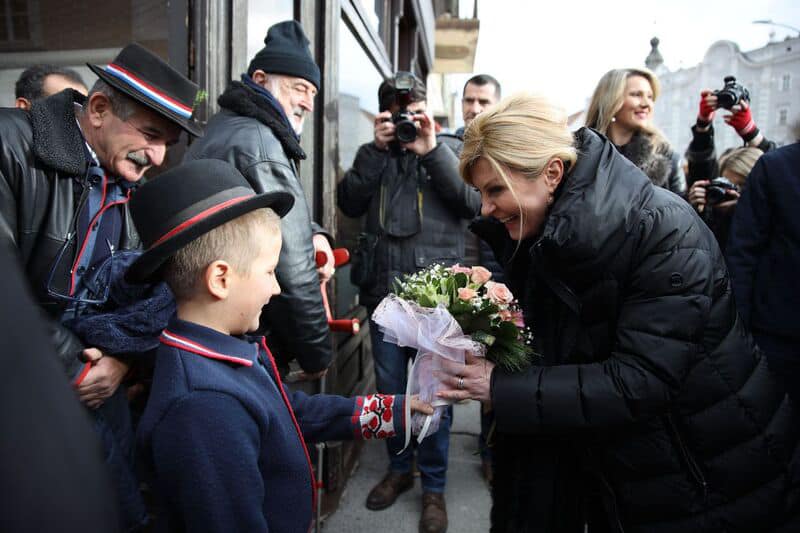Croatian Zoran Milanović First Former Prime Minister Elected President
Although only 53 years old, Croatian President-elect Zoran Milanović is already a political veteran. Since Croatia's independence, he is the only politician to be elected to two of the most important state functions, first as prime minister and now president.
He was born on October 30, 1966 in Zagreb. In private conversations, he likes to point out that Zagreb shaped his identity, but was also intrigued by his family history, according to Robert Bajruš/Jutarnji List on January 6, 2020. Therefore, Milanović researched archives from Austrian barracks and the Sinj monastery in a quest for information on his ancestors and their life paths. Zoran Milanović's family is from western Bosnia and arrived in the Sinj region as part of a mass migration led by Franciscan Friars in 1687. His mother Đurđica Matasić's family has lived in Sinj for almost two centuries.
Father Held Key Zagreb Government Positions
His father, Stipe Milanović, performed several important roles during the socialist regime: he was Cabinet Secretary to Miko Tripalo, a Zagreb city council member and chaired the Vatroslav Lisinski Hall Construction Committee. In the early 1990s, he joined HDZ (Croatian Democratic Union) and became Assistant Minister to Vlatko Pavletić.
Milanović's claim that his grandfather was an Ustasha member (Croatian WWII Fascists) was one of the more interesting developments in the 2016 election campaign. He was referring to his mother Đurđica’s stepfather, Petar Plišić, but had kept silent about him until then.
He graduated from the Faculty of Law in Zagreb in the early 1990s where he was an excellent student. He received the Rector's Award and participated in the "Telders" competition in public international law at The Hague.
Began Post Law School Career in Foreign Diplomacy
Milanović landed his first job at the Commercial Court in Zagreb and then the Ministry of Foreign Affairs in 1993, where he arrived upon the recommendation of Ivan Šimonović, professor at the Faculty of Law and Permanent Representative of the Republic of Croatia to the UN. He became advisor to the Croatian Mission to the European Union and NATO in Brussels in 1996 and completed a postgraduate certificate in European Union law there two years later.
He joined SDP (Social Democratic Party of Croatia) immediately after his return to Zagreb in 1999. After SDP won the January 3, 2000 elections as part of a coalition, he was entrusted with a position in communications with NATO. Three years later, he was appointed Assistant Minister of Foreign Affairs under Tonino Picula. However, he left diplomacy and was brought onto the SDP Executive Board at the invitation of Ivica Račan after the HDZ won the 2003 elections.
Assumed SDP Leadership Role After Račan
The SDP party membership overwhelmingly chose Milanović as their new leader when Ivica Račan died in 2007. He had defeated Željko Antunović, Milan Bandić and Tonino Picula; the party’s old guard. While Račan had not considered him his successor; within a month Milanović had taken control of SDP and set about overthrowing Ivo Sanader.
Diana Pleština, widow of the former SDP leader, spoke about the Račan-Milanović relationship. While she has always thought well of Milanović; she also noted:
"Ivica Račan understood that Milanović was young and well-educated, and had experience communicating with the outside world, but he was not referring to Zoran Milanović in the phrase 'New SDP Force'. Instead he was referring to Milanović along with other members of the party. Therefore, the ‘New SDP force’ was not referring to one person, but an overall proposal to continue the rejuvenation of the Social Democratic Party, and one of those players was Milanović,” Dijana Pleština recalled.
However, he lost to Ivo Sanader in the 2007 parliamentary elections and spent the next four years leading the opposition. During that time, he was able to marginalize the old guard within SDP and surround himself with a new generation of associates including Ranko Ostojić, Siniša Hajdaš Dončić, Rajko Ostojić, Ante Kotromanović, Igor Dragovan and Gordan Maras.
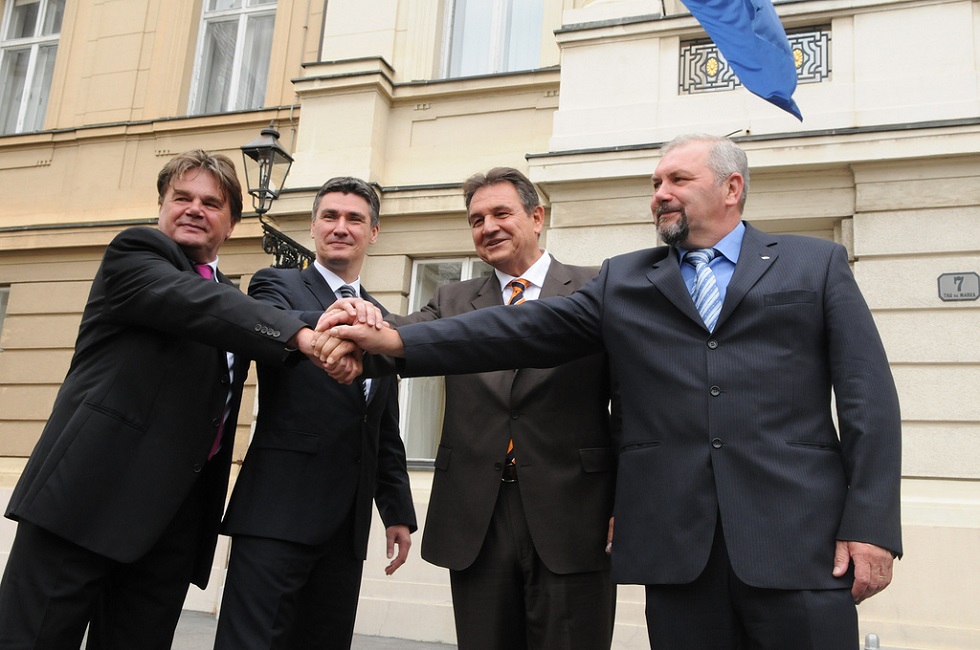
Defeated Scandal Ridden HDZ With Kukuriku Coalition
In November 2011, under Milanović’s leadership, the SDP-HNS-IDS-HSU coalition overwhelmingly defeated HDZ, which had been rocked by a series of corruption scandals. Their coalition ruled Croatia for the next four years. Before that victory, Milanović played a crucial role in the election of SDP presidential candidate Ivo Josipović. Josipović's victory had a strategic effect on the downfall of HDZ and Prime Minister Jadranka Kosor, and subsequent victory of the four-party coalition.
Milanović's political experience did not often reveal itself during his first three years in office. In the face of poor economic performance, he was subject to widespread criticism for refusing to make severe cuts to a bloated and inefficient state administration, which was stifling the economy. In addition, almost nobody believed he could make a comeback after he barely succeeded in expelling Slavko Linić from SDP in June 2014. Those doubts were strengthened after Kolinda Grabar-Kitarović narrowly defeated Ivo Josipović in the 2015 presidential election.
"Who would have thought that we were capable of regaining voter confidence back in January," Milanović recently suggested in a private interview.
Political Personal Evolution and Move to Right
Nevertheless, he changed tremendously and became much more accessible while choosing to remain silent about the confrontation with Linić. Even then, a well-known SDP politician revealed that he had been closely observing Milanović's career for seven years, and denied the widespread belief that the SDP chief was incapable of transforming himself:
"After losing the election to Ivo Sanader in 2007, Milanović realized that he had to change. He succeeded because he strengthened the party with new young talent. I’ve also changed and have begun displaying a better part of my character in interactions with people. That’s why I believe he can also change in a positive way,” claimed this member of government.
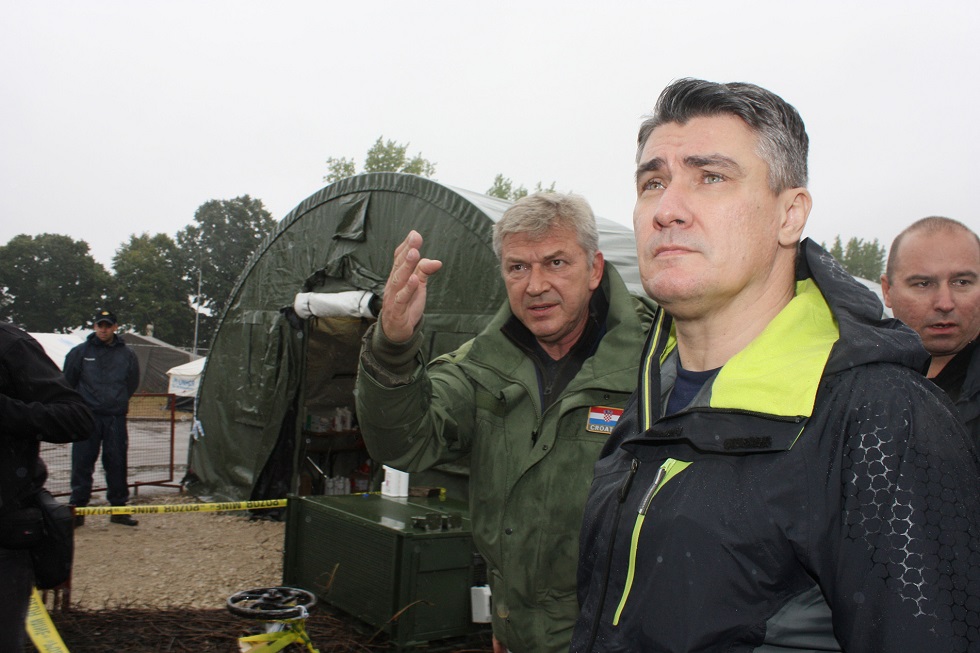
Praise for Franjo Tuđman and Croatian Nation in Knin
After all, Milanović's metamorphosis, which manifested itself in a slight turn to the right, was first noticed in Knin on August 5, 2014 when he gave a speech commemorating Dan domovinske zahvalnosti (Homeland Thanksgiving Day), which suggested a more patriotic direction. It was then that he first came forward with the conviction that his government was a people's government elected by the Croatian nation, comprised of people who are of primarily Croatian background. "As long is that is the case, we will oversee this country and lead it on the right path with Croatian interests in mind," Milanović said.
Milanović also paid respect to the first Croatian president, Franjo Tuđman, "because he was the Croatian president during a most difficult and challenging time."
“We have been waiting for a thousand years to have our own state and are grateful to those who gave everything for our country. For thousands of years we have worked, fought and died for foreigners, who treated us like foreigners, but they are not our enemies today. We are united with them in the EU and are building a better future together,” said Milanović in Knin.
It was the beginning of a 16-month campaign in which Zoran Milanović decided to tackle the stigma of (Croatian) leftists and present himself as a self-aware national leader. A social democrat who respects Tuđman, frequently mentions Croatia and condemns chauvinism then became his election-winning formula.
He also hired PR expert Alex Braun and his government achieved positive economic results in 2015. However, Milanović narrowly lost the parliamentary elections, remained at the helm of the SDP and defeated his old rival, Zlatko Komadin, in party elections.
Withdrawal from Politics After 2016 Defeat
After the fall of Prime Minister Tim Orešković’s short-lived administration in late 2016, Milanović led the People's Coalition into the elections, but lost, and then announced that he was withdrawing from politics.
In November 2016, he founded EuroAlba Advisory. Earlier this year, the media reported that the company's total 2018 revenue was 744,970 HRK (99,700 EUR), about a 20 percent increase from a 2017 reported revenue of 625,000 HRK (83,600 EUR).
Milanović lost his father Stipe and his younger brother Krešimir, who died after a short illness, during his election campaign late last year.
Follow our Politics page to stay updated on the new Croatian presidency and upcoming 2020 parliamentary elections.
Croatia Presidential Election: Milanović Defeats Incumbent Grabar-Kitarović
According to final election results, released at 5:30am CET (Central European Time) on January 6, 2020; former Prime Minister Zoran Milanović has defeated incumbent Croatian President Kolinda Grabar-Kitarović and won his first five-year term as President of Croatia.
Here is a breakdown of the final election results with 100% votes processed (updated 5:30am CET):
52.67% - Zoran Milanović – Former Prime Minister | SDP
47.33% - Kolinda Grabar-Kitarović – Incumbent President | HDZ
Former Croatia Prime Minister Began Career as Diplomat
Zoran Milanović, born in 1966; was Prime Minister of Croatia from 2011 to 2016. He was also the leader of SDP (Social Democratic Party of Croatia), the largest center-left political party, from 2007 to 2016. He served as leader of the opposition twice, from 2007 to 2011 and for several months in 2016.
Milanović began his career in the Croatian Ministry of Foreign Affairs. He served as advisor at the Croatian Mission to the European Union and NATO and was assistant to the Foreign Minister of Croatia for political multilateral affairs.
Oversaw Croatia Entry Into EU in 2013
In June 2007, Milanović was elected President of SDP and formed a coalition uniting four center-left political parties, which won an absolute majority in the 2011 parliamentary election. He became Prime Minister later that year and oversaw Croatia’s entry into the EU in 2013.
His cabinet introduced changes to the tax code and began several large infrastructure projects. Milanović also supported the expansion of the rights of same-sex couples and introduced the Life Partnership Act.
Post-Political Career as International Consultant
He served as Prime Minister until 2015 and led the four-party coalition until early parliamentary elections in 2016. Milanović announced his withdrawal from politics following a surprise defeat. He began a career as a consultant and worked as advisor to Albanian Prime Minister Edi Rama.
In June 2019, Milanović announced his campaign for President of Croatia under the slogan “A President with Character.” He ran on a center-left platform, his record as prime minister and promised to be tough on corruption.
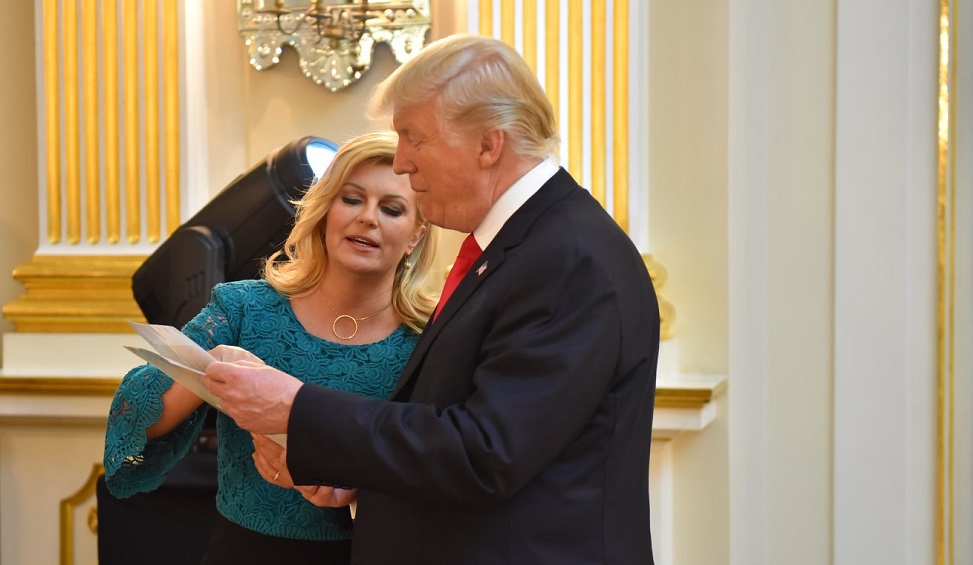
Kolinda Grabar-Kitarović and Donald Trump | Facebook
First Woman and Youngest Croatian President
Kolinda Grabar-Kitarović, born in 1968; has been the President of Croatia since 2015. She was the first woman and the youngest person to ever assume the office. In 2017, Forbes magazine listed Grabar-Kitarović as the world's 39th most powerful woman.
Before her election, Grabar-Kitarović held several governmental and diplomatic positions including Minister of European Affairs, Minister of Foreign Affairs and European Integration, Croatian ambassador to the United States, and NATO Assistant Secretary General for Public Diplomacy.
She was the only female candidate in the Croatian presidential elections held in December 2014 and January 2015 and was runner-up in the first round. She narrowly defeated incumbent President Ivo Josipović in the second round.
International Press Attention at 2018 World Cup
In 2018, Grabar-Kitarović received international press attention for attending the FIFA World Cup quarter-final and final matches, where she wore colors of the Croatian flag in support of the national team, who finished the tournament in second place.
Gaffes and Controversial Endorsements
Her presidential re-election campaign has weathered a series of gaffes and missteps. Last month, she claimed at a campaign rally in Osijek that she had secured jobs for Croatian citizens to work from home for 8000 EUR, after they had received training abroad. However, she later declined to provide details.
While she has positioned herself as a centrist, she welcomed endorsements from several controversial and far right-wing political figures. Marko Perković Thompson, a singer known for his use of WWII Croatian fascist symbols and language in performances, backed her re-election. And Grabar-Kitarović’s website featured a video message from Julienne Bušić, American-born author and activist, who hijacked a TWA flight in 1976 to promote Croatian independence. The party of Zagreb Mayor Milan Bandić, who is facing corruption charges, also endorsed her candidacy.
Former Prime Minister Maintained Solid Lead in First Round
According to exit polls in the first round of elections, held on December 22, 2019; Zoran Milanović maintained comfortable leads over Grabar-Kitarović and Miroslav Škoro, his two main opponents. Grabar-Kitarović was initially polling within one percentage point of Miroslav Škoro, which led to doubts about whether she would advance to the second round. According to final election results, Milanović received 29.55% of the vote and finished ahead of Grabar-Kitarović (26.65%) by nearly three percentage points. In turn, she eliminated Škoro (24.45%) from the run-off by a lead of just over two percentage points.
Grabar-Kitarović and Škoro, a popular folk musician, competed for support from center-right and far-right political parties and organizations, which led some analysts to believe that Škoro supporters would automatically shift their allegiance to the president in the run-off. However, pre-election polls had generated inconclusive results; with the President and former Prime Minister polling within a margin of error and leaving behind a large block of undecided voters. While Škoro confirmed that he would vote at the polls; he declined to endorse either candidate – and said that he would void his ballot.
Both candidates agreed to three debates, which were held on Monday, Thursday and Friday preceding the election. Mutual accusations of incompetence, impropriety and dishonesty dominated the discussions, which offered little on specific policy proposals.
Follow our Politics page for updates on this presidential election and upcoming 2020 parliament elections.
Croatia Presidential Election Silence: Live Updates Sunday as Polls Close
As of 12:00am Saturday January 4, 2020; the two-day electoral silence is in effect for Croatia. It will end at 7:00pm CET on Sunday, after polling stations close, and TCN will be providing live election updates.
Approximately 3,860,000 second-round voters will decide whether current Croatian President Kolinda Grabar-Kitarović (HDZ) or former Prime Minister President Zoran Milanović (SDP) will head the country for the next five years.
Widespread Electoral Silence Imposed by Croatia SEC
The so-called electoral silence is imposed by the SEC (State Electoral Commission) before any election campaign in Croatia, according to Index on January 3, 2020. On Saturday, the day before an election, and Sunday, election day; the publication of estimates, results and previous unofficial election results are prohibited. This ban also applies to photos, statements and interviews from the two presidential candidates.
The State Election Commission (SEC) urged candidates, their nominees, voters, the media and media publishers to respect the silence.
No Penalties for Violating Electoral Silence
"I urge participants and voters to respect the principles of the electoral silence. I also ask that candidates discontinue promoting themselves or their programs," cautioned SEC Vice President Vesna Fabijančić-Križanić.
“Whether or not the electoral silence is a desirable practice is debatable, but this is the law and it must be respected. We urge everyone abide by the law, even though there aren’t any penalties imposed for violating it," the SEC vice president emphasized.
The SEC reminds the campaigns not to post new posters or leaflets for the two candidates, call citizens, or send them SMS messages or e-mails asking them to vote in this second round of presidential elections.
Social Network and Media Included in Electoral Silence
Social networks are included in the electoral silence as well. Therefore, media and media publishers are expected to remove everything from their program content which represents electoral advertising: including official advertisements, links, image links-ads (banners) which lead to candidates' campaign websites.
At midnight, the deadline for Grabar-Kitarović and Milanović to collect donations also expired. According to reports, the HDZ candidate, received 2.3 million HRK (308,700 EUR) from donors as of December 27, 2019 while the SDP candidate collected 813,000 HRK (109,000 EUR).
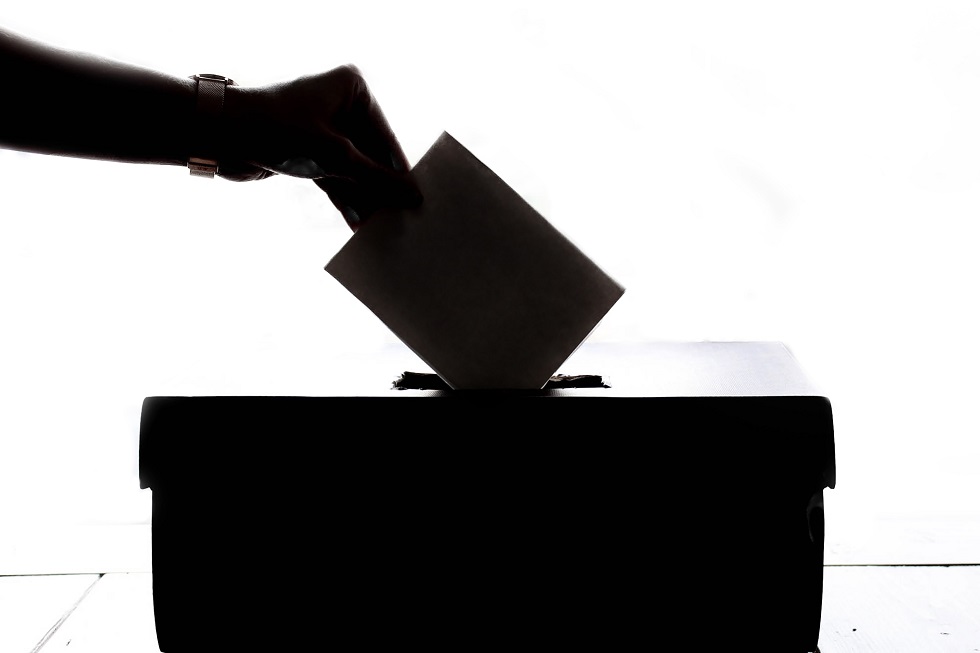
Element5 Digital | Unsplash
Polling Stations Will Open in 47 Countries
Elections for the Croatian president continued to a second round or runoff, because none of the 11 candidates received the required majority in the first election, which was held on Sunday December 22, 2019. The candidate who receives the highest number of votes in this round will win the election.
In addition to Croatia, presidential elections will be held in 47 other countries, with the first polling stations opening in Australia as early as Saturday night, Croatian time (CET).
Live Election Updates on TCN Starting 7:00pm CET
Follow our Politics page for live updates for the upcoming presidential election in Croatia, which takes place tomorrow Sunday January 5, 2020. We will be providing by-the-minute exit poll results and final election results after the polls close at 7:00pm Central European Time (CET).
Croatia Presidential Debate: Hopefuls on Corruption, Taxes, Foreign Policy
On Thursday evening January 2, 2020; HRT (Croatia Radio Television) moderated the second of three debates between presidential candidates Croatian President Kolinda Grabar-Kitarović and former Prime Minister Zoran Milanović.
During the two-hour debate, the candidates answered 40 questions – which were divided into several groups including the economy and demographics, foreign policy and presidential powers, national security and the fight against corruption. Of course, there was a set of questions pertaining to worldviews and personal questions, as reported by Index on January 2, 2020. Here are a few highlights from last night’s debate:
Candidates’ Opening Statements:
Milanović: I am aware that I need to reach out to people who don’t intend to vote for me in the second round. I will defend the constitution and fight for the rights of all citizens. I will fight corruption, the monster which has consumed Croatia. The present government and president do not understand the difference between the public and private. Nor do they understand what it means to fight corruption. Those who break the law will not get any preferential treatment from me.
Kolinda: As a woman, I broke through the glass ceilings in the world. I was the first woman foreign minister, have important world connections and was one of the first presidents to meet Trump. I will move away from ideological issues.
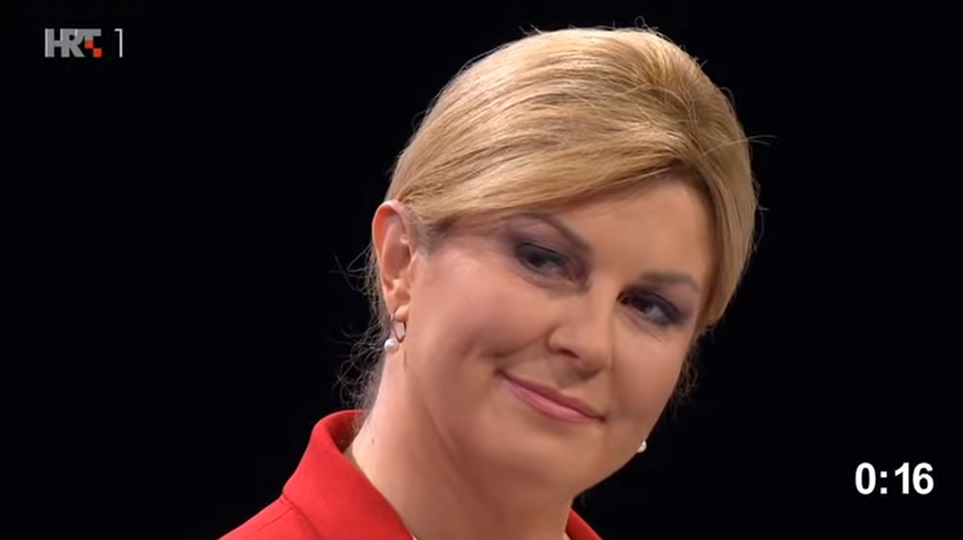
Entrepreneurs are complaining about high taxes. Are they too high?
Kolinda: The tax burden is too great. I do not want to please everyone, otherwise I would say what everyone wants to hear, and I am already too controversial. Zoran Milanović's government raised the VAT from 23 to 25 percent, which was a big blow. I am in favor of reducing taxes because that is the only way to secure higher salaries, create new jobs, investments and encourage people to stay. I will advocate for higher take-home wages and higher wages for employees.
Milanović: You are saying this to please everyone. Life is not like that, and it’s easy for someone who has never earned anything on their own. It is expensive to finance state obligations; including education and care for the elderly. Increasing the VAT rate during the recession was not a blow. Prices did not rise, so that thesis that does not hold water.
Kolinda: I’ve been working for a living since my third year of college. You addressed the deficit by increasing the VAT. I won’t allow you to downplay this failure because it was the VAT that impoverished our citizens. You had a budget deficit with a higher VAT. You can’t rely only on taxes to finance the state budget.
Milanović: How else would the budget be financed? From exports? This shows complete ignorance of fiscal policy.
How do we bring young people back to Croatia?
Milanović: The exodus began in 2016. Poland, Romania, Lithuania had the same problems after joining the EU. Did it destroy those states? As far as I know it did not. We are having moral panics in the Republic of Croatia. We are here, we will fight, we will survive, and they will return. I cannot blame either Milanović or Kolinda for the exodus.
Kolinda: The exodus began during the Milanović government due to pre-bankruptcy settlements and enforcement law. I'm not having a moral panic.
Milanović: Thousands of jobs were saved by pre-bankruptcy settlements, it's ridiculous to say that this is the reason for the exodus. Please don't embarrass yourself.
Kolinda: The fact is that pre-bankruptcy settlements benefitted your friends.
Who is Croatia's biggest ally?
Kolinda: It's the US and we are currently working on concrete proposals.
Milanović: Ms. Kitarović accomplished nothing when she was Croatian ambassador to the United States. You must be totally lost if you are claiming that the United States is our greatest ally. If the US is our closest ally; we are certainly not theirs. The current administration is what it is, and I don't want to fault them, but the EU is our biggest ally and the largest agent of peace in the world.
Kolinda: Of course, we are working with all EU countries. Let’s allow Milanović to highlight some of his achievements with Germany. Croatia is thinking about Croatia today, but is acting globally.
Milanović: I’m not out camping, I’ve worked, traveled, and hung out with the Scandinavian elite. Kolinda was an ambassador to the US and fled to NATO.
Kolinda: I've never turned my back on Croatia. Seventy percent of our foreign trade is with the EU. It is very important for us to work with Serbia and Bosnia and I want them to join the EU. But Milanović quarreled with all our neighbors. Where I build, you destroy.
Milanović: I'm glad to hear these phrases. Relations with neighbors have been the most corrupted by Kolinda. Now we only have a good relationship with Orban (Hungary). As for migrants (backed up at the border with Serbia in 2015); if we hadn't arranged for them to be transferred to Germany, those people would still be here with us now.
Kolinda: You caused that incident, you closed them off in Serbia.
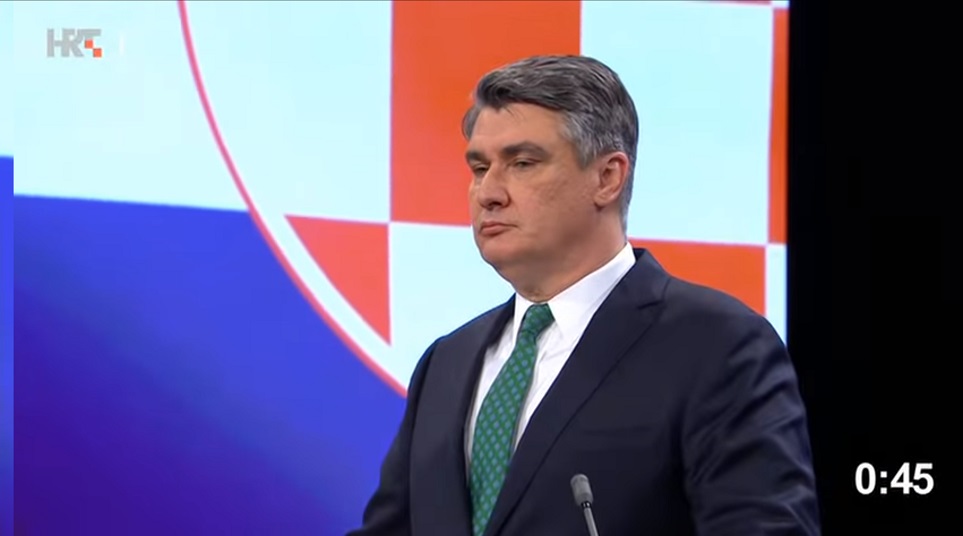
Do Jihadists in Bosnia pose a threat to Croatia?
Milanović: I believe SOA (Security and Intelligence Agency) is doing its job. Jihadists in Bosnia are a reality. Standard law enforcement measures will not help the situation there. Kolinda has damaged relations with a country with a Muslim majority due to her reckless stories.
Kolinda: I have don’t have any problems with Muslims. I didn't ruin the SOA; I don't interfere with their work.
Milanović: Kolinda hangs out with people who steal. I'm not saying she's stealing, but she's a serious problem for the system of national security.
How would you detect and prevent corruption?
Milanović: Saucha (former assistant to Milanović) has been indicted, and he now supports Kolinda and the HDZ. Kolinda arrived (to the debate) today from a celebration held by (Milan) Bandić - these messages are dangerous and toxic.
Kolinda: I did not come from a celebration. I was at an event held by a party which supports me comprised of individuals who support me.
Bandić has been indicted in several court cases. Why would offer to bring him cookies?
Kolinda: Bandić is innocent until proven guilty and I will fight for that. Let's not put people on a pillar of shame. Let's not forget Lovrić-Merzel (SDP), and you defended Bandić when he was your friend. Would you pardon Perković and Mustač (Yugoslav Secret Police)?
Milanović: I would not pardon anyone. You are talking to me about corruption. I have a letter here that you sent to the Washington Times praising Sanader before he fled justice.
Kolinda: I had no idea about Ivo Sanader's corruption. After all, he had dismissed me from the government.
Should the Croatian army withdraw from Afghanistan?
Milanović: Yes, immediately. It's been 16 years and it’s obvious that the Americans are not even clear on what to do there.
Kolinda: There has been one (Croatian) death since 2003. We will act as a responsible ally with NATO. My guess is that this process will begin sooner rather than later, and we will discuss it with our allies. Then, we will shift most of our forces to Eastern Europe.
Milanović: We are open to discussion, but we’ll make the decision. The soldier who died had his picture taken with me and asked me not to post the photo because he was still a specialist. A few days later, Kolinda posted a photo with that soldier. I would never manipulate people like that.
Kolinda: That’s false. The soldier waited for an hour at Ovčara to have his picture taken with me. He never asked me not to post that photo.
What do you think about the adoption of children by same-sex partners?
Kolinda: The adoption and foster care application process is very difficult in general, and we need to make it easier. Children need both a mother and father; I do not know if we are ready for the adoption of children by same-sex couples.
Milanović: That is a process which is unstoppable. We need to talk about it, accept it and understand that these trends are unstoppable. And there is a human element to this topic.
How much have your personal assets grown during your five-year term?
Kolinda: I don't know exactly. I’ve put everything in my asset statement. This year, I received a severance from NATO of around one hundred thousand euros. My husband and I live off our wages.
Milanović: That's nice when you get such a large severance pay. At the beginning of your term you had a loan of more than one million HRK. And that was paid off with what money?
Kolinda: I obtained a loan in 1995 with a 4.5 percent interest rate. I had to take out another loan in at a full (interest rate), but that loan was paid off in two years by selling some smaller apartments. How did you get the 180,000 EUR loan at a preferential interest rate?
Milanović: You are making things up again and everything you say is wrong again. This is public information. I was not the prime minister at the time. And, it was a loan for 300,000 EUR with a 6 percent interest rate. I paid back the first portion by selling our first apartment. Not only is this defamation, it is nonsense. At the time of Operation Storm, you got a loan with a 4 percent interest rate when everyone else’s loans were at 14 percent.
Kolinda: Yes, I got that loan as a Foreign Office employee. It was the minimal amount of credit, because I could not afford to borrow more. I paid it off. I’ve worked for all the money I have.
Milanović: That was credit available HDZ guys. You worked for that? It's unfair, dishonest and immoral…
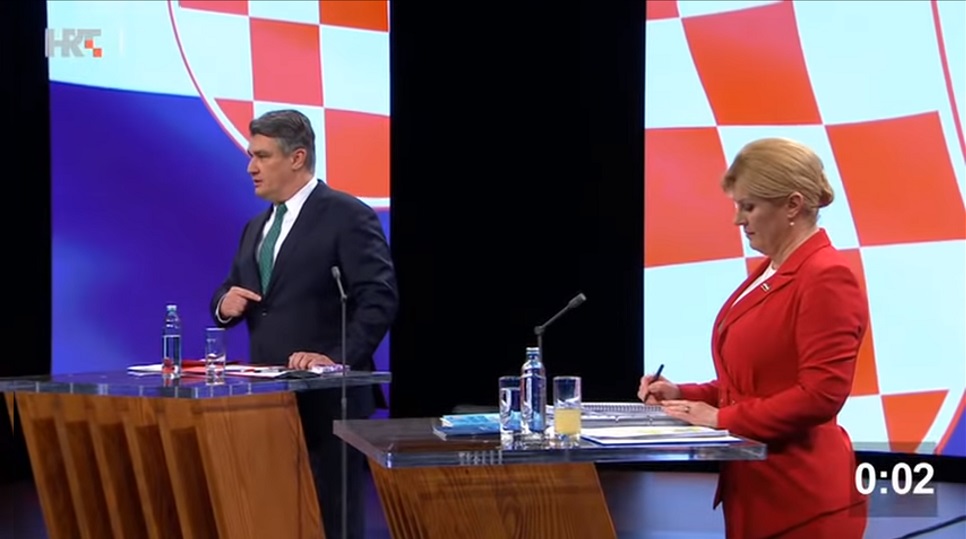
What did Kolinda mean when she talked about the coup?
Milanović: In 2015, Kitarović formed her government, after only 40 days of consultations with (Tomislav) Karamarko which went on behind my back. She was doing her best to undermine the center-left government.
Kolinda: In the first two years of my term, two rounds of parliamentary elections were held. I absolutely stand behind my claim that I maintained the stability of the state and did everything according to the constitution. There was a possibility of having a transitional government if one did not form within a reasonable time period.
The constitution provides for a 60-day window, so I consulted with constitutional lawyers and the Constitutional Court. I was told that this lengthy procedure would have to be completed because the Parliament would find themselves in constitutional crisis if their mandate expired. I never appointed any government and please don’t slander me. Find the evidence!
Milanović: Of course, you didn't leave any tracks, but people are talking. Sue them if they slander you. Personally, I will respect the constitution. And, (Vladimir) Šeks is a constitutional expert?
Kolinda: Šeks had nothing to do with it, and there weren’t any secret negotiations. You wanted a coup, so you barricaded yourself. Furthermore, you sent me a text message which read: “today you can be a stateswoman and appoint a government or you can give Karamarko control and be his puppet.”
Milanović: That’s defamation, I would never send that kind of message.
Closing Statements:
Milanović: In a few days you will elect a Croatian president. I am here to serve you, not to divide you, to fight against what antagonizes our people, for which they are losing the will to live and stay (in Croatia). Demographics are most successful if a country has fair leadership. For years, we have been led by people who are not fair leaders, but who have networked by formal and informal means. We have a president who hangs out with unworthy people, and a government which has fallen apart because of corruption. This is sending a terrible message. Nothing revolutionary will happen (if I become president), but we believe in making small shifts.
Grabar-Kitarović: When I took office five years ago, Croatia was on its knees because of the disastrous policies of Zoran Milanović, the worst Croatian Prime Minister in history. We have achieved growth which is not yet adequate. I want the GDP to be above five percent, and that positive factors impact your lives and financial obligations. We must stop young people from leaving and complete the process of education reform. We need to encourage entrepreneurship, create jobs, increase wages and pensions, and raise the standard of living. I am interested in our country, not party politics. I unite, rather than divide. My Croatia is a Croatia for everyone.
The presidential candidates will meet for one more debate before the election. Tonight (Friday January 3, 2020) at 20:20h, they will face off on Nova TV.
Follow our Politics page for news on the upcoming presidential election in Croatia, which will take place on Sunday January 5, 2020. We will be providing by-the-minute exit poll results and final election results after the polls close at 19h Central European Time (CET).
Croatia President's Campaign Demanded TV Network End Debate
According to a statement released by RTL this morning, an adviser to the Kolinda Grabar-Kitarović campaign demanded that RTL end yesterday’s debate due to the Croatia President’s fatigue. However, both campaigns had already agreed in advance that they would permit the debate, which began at 20h yesterday, December 30, 2019; to last longer than 90 minutes.
In addition, both candidates publicly agreed to continue the debate when asked by RTL moderators during the broadcast, according to Vijesti/RTL on December 31, 2019. The debate, which attracted over 1 million viewers, lasted almost two and a half hours and ended around 22:30h.
RTL Releases Statement About Ending Debate
“The end of the debate was requested by Advisor to the President of the Republic, Ms. Renata Margaretić Urlić, who arrived at RTL studios with members of Croatia President’s campaign headquarters. During the debate, she entered the television control room and demanded that 'due to the prolonged duration of the debate and fatigue of the president, it must end immediately.' When asked by the debate’s editor if that was the official position of the campaign headquarters, Ms. Margaretić Urlić replied that she had 'entered on behalf of the headquarters.'"
The RTL debate moderators conveyed the request (without mentioning who it came from) to presidential candidates Kolinda Grabar-Kitarović and Zoran Milanović, but also offered them the opportunity to continue the debate, to which they both publicly agreed.
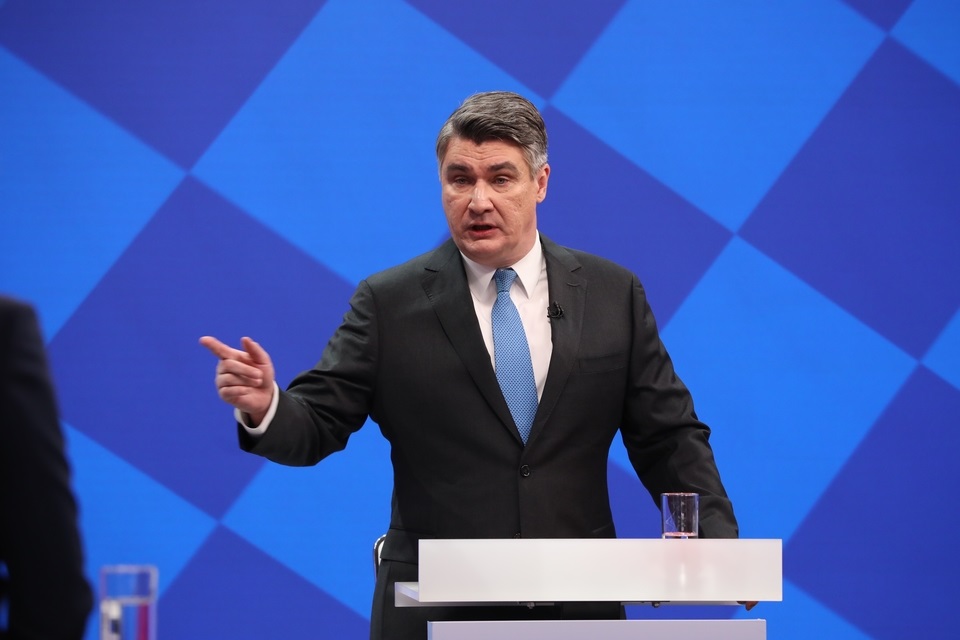
Former Croatia Prime Minister Responds
Upon learning of his opponent’s campaign demand to end the debate; Milanović wrote on Facebook:
“I came to a television debate last night with a severe cold and fever, but at no point did it occur to me to put my mild health problems ahead of the rights of our citizens to see and hear what the presidential candidates have to say. Getting tired of the debate in front of Croatian citizens whose trust you are seeking; what does that mean? If you are not able to talk for two hours about topics that are plaguing Croatia, then you are not capable of leading Croatia. Unless the reasons and motives for interrupting the debate have to do with something else…”
Indeed, the former Prime Minister appeared to have a runny nose and his sniffling was audible, if not distracting, during the entire debate.
Highlights from Monday’s Presidential Debate
Here are a few highlights from the debate according to Index on December 30, 2019:
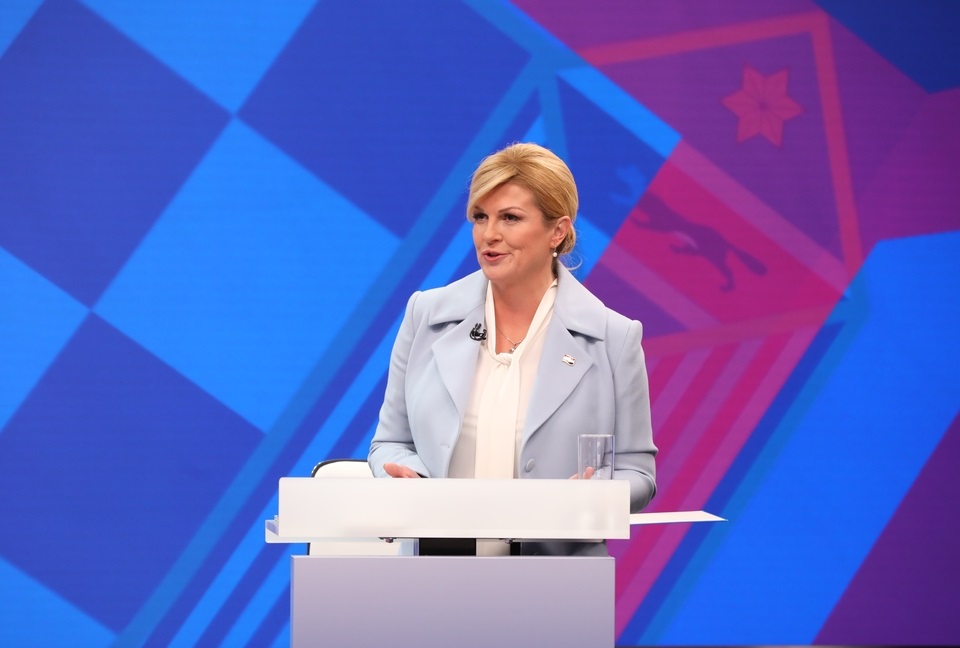
Ms. Grabar-Kitarović, why are you the best choice?
Kolinda: "What I am offering is a program. Our country was in crisis five years ago. The exodus of young people had already begun, and Croatia is in a better position today. I believe that our citizens should take those preexisting macroeconomic factors into account. Every citizen lives better now. I was the change that was needed in 2014, and now I'm looking for continuity."
Milanović got the same question: Why is he a better choice than Kolinda?
Milanović: "I have experience. I will behave in a positive predictable way. I left government while (Croatia) was in a period of growth."
Kolinda: "Croatia was devastated at the time of my arrival and the flames of pessimism were burning."
Milanović: "The year of 2015 ended with growth in the fourth quarter. Interest rates were at their lowest and there was growth in the GDP."
Kolinda: "In terms of experience, apart from experience in Croatia, I have international experience.”
Milanović then pointed out that the Sanader government, in which Kolinda had an appointed seat, still owed Croatia 135 billion HRK (18.1 billion EUR). Note: Former Prime Minister Ivo Sanader was just convicted of corruption and sentenced to 6 years in prison.
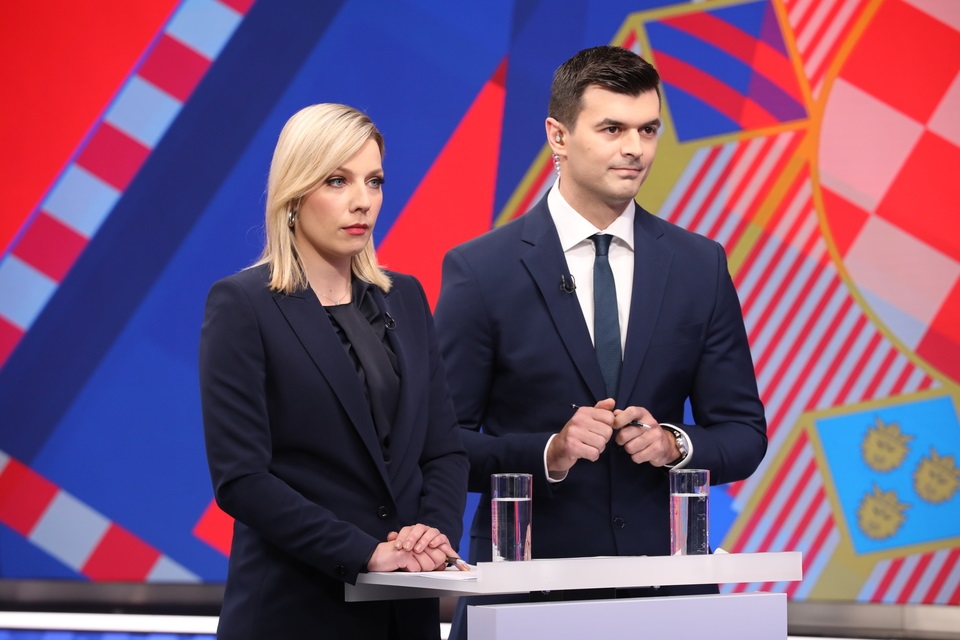
Mr. Milanović, is there anything about Kolinda’s leadership worth commending? Is there anything you would continue to do?
Milanović: "I would not continue."
Mr. Milanović, Vučić attended Kolinda's inauguration, would you have invited him?
Milanović: "I was a career diplomat. Sanader brought Kolinda on board. I did not invite Vučić to Croatia. I do not think that this should be taken out on Serbia. I would not have invited Vučić. But its necessary to work with these people (Serbian citizens). And I mean work with them, not hug them, then create diplomatic chaos and fan flames."
Kolinda: "I'm fanning flames…I said that until he fulfills his promise to find the missing (from the Homeland War), there wouldn't be another in-person meeting."
Milanović: "You were the right hand of political commissioner Ivo Sanader. Vučić create a circus here, and that's your contribution. I can talk to Vučić about missing people, but time goes on, and business goes on too. I will deal with the missing as well as business matters."
Should Croatia block Serbia on its way to the EU?
Milanović: "No. That country has the misfortune of being led by a junkyard war guy. This man is working on behalf of the Belgrade bazaar, but he is not leading the Serbian state and people. But I see a partner (in Serbia) and Croatian companies are working there."
Kolinda: "I decided to stay in Croatia, I am the daughter of a butcher who advanced in position."
Milanović: "You are from a wealthy family and a very slippery person. My father left the (Communist) party."
Kolinda: "For as much as my father had worked in Yugoslavia, he could have been a billionaire in another country."
In Bosnia, most of the voters support HDZ. How can you convince them that you are a better choice?
Milanović: "It doesn't appear that I have their support. But I don't blame them. I'm here to help. When it was necessary to give them millions in funding, we were there. We invested in a series of targeted projects, including building Catholic schools. My conscience is at ease."
Kolinda: "Congratulations. But it would be a good idea to listen to them a little more. You consider them to be second-class citizens and want to deprive them of suffrage."
Milanović: "When did I say that?"
Kolinda: "I am fighting for Bosnia and their voters. For years I have been advocating for Bosnia to enter into a concrete plan for NATO membership."
What do you think about Trump?
Kolinda: "Trump is the President of the United States, and there is currently a court process against him. I did not choose the President of the United States. The way I treat him is governed by my goal of taking care of Croatia's interests. At this stage, we are in the process of signing a double taxation treaty. We are also in the process of abolishing the visa (compulsory for Croatian citizens wishing to visit the US). Of course, I would meet with him in person."
Milanović: "I would not comment on Trump, that was not my choice."
The Euro could be introduced to Croatia in 2023. Are we prepared?
Kolinda: "I think we were ready during the first Sanader government. We moved away from that during your government."
Milanović: "Again, Sanader. A little more and the man will become a demigod. We were not members (of the EU) at the time. While you were hunting for generals (Croatian generals who were indicted by the War Crimes Tribunal and in hiding) around the world, we didn’t have any chance of entering."
Milanović: "Croatia could soon become eligible if it cuts its public debt. Look at the Czech Republic, Hungary and Poland, they are not entering the eurozone, but they could. These are older countries, and they are calculating. The claim that loans will be cheaper does not hold water. That correlation simply doesn't exist. But I'm not against it and am interested in discussing the options. These are complex topics…”
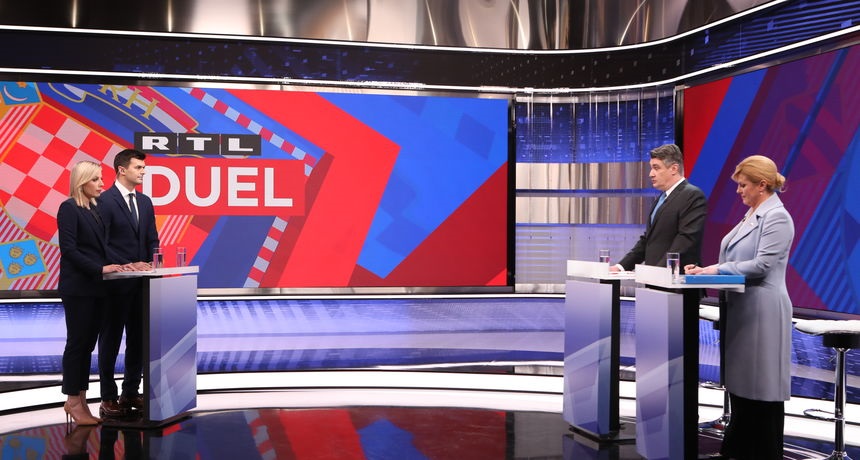
What is your relationship with (Milan) Bandić? What does he have to offer?
Kolinda: "He is the mayor of Zagreb. Everyone is innocent until proven guilty. We cannot find someone guilty and then prove that they are innocent. How many people have been imprisoned and then it turned out that they were imprisoned without cause? This is a principle I will always fight for."
Milanović: "In Croatia, fools are making a living from work, and members of the HDZ are making a living from missing evidence. I defeated him (Bandić) in SDP, and then expelled him from the party. He became your friend when he got out of detention."
Kolinda: "The presumption of innocence exists for everyone."
Milanović: "It is a disaster; this man came into my life when I defeated him in the party elections. These are friends of Ms. Kitarović. Bandić is dangerous and it's a disgrace for the city I live in. Not because he’s Herzegovinian, that’s my origin too, but it's a shady crowd."
Kolinda: "That's a man you once called your friend. I'm working with him to open kindergartens, build stadiums, deal with graffiti."
Let's say you are in Herzegovina and you run into (Zdravko) Mamić, what would you do?
Kolinda: "I would say come back to Croatia and face justice."
Milanović: "I would probably shake hands. I wouldn't say anything to him. He already knows what people think. He is a phenomenal manager, but I don't know why he became a thief."
A video of the debate can be accessed here.
Both presidential candidates will meet for two more debates before the election. On Thursday, January 2, 2020 at 20:05h they will debate on HRT. And on Friday at 20:20h they will face off on Nova TV.
Follow our Politics page for news on the upcoming presidential election in Croatia, which will take place on Sunday, January 5, 2020. We will be providing by-the-minute exit poll results and final election results after the polls close at 19h Central European Time (CET).
Croatia President to Debate Former Prime Minister on RTL
Current Croatia President Kolinda Grabar-Kitarović and opponent former Prime Minister Zoran Milanović have officially accepted RTL's invitation to participate in a presidential debate, which will be held at 20h on Monday, December 30, 2019 – according to the television network.
This will be the first debate between the two remaining presidential candidates who entered the runoff after the December 22 elections. The runoff will take place on Sunday, January 5, 2020.
Debate Will Last 60 to 90 Minutes
The debate will be moderated by Damira Gregoret and Ivan Vrdoljak and edited by Ana Bulić on RTL. It will last between 60 to 90 minutes, which is considerably shorter than the first two-and-half-hour debate, which included all eleven first round presidential candidates. As announced, the two remaining candidates will answer questions regarding political, economic, social and other topics of public concern. Each candidate will be given equal time to respond.
During his appearance in Split on Saturday, Presidential candidate Zoran Milanović said that he expects RTL to agree that ideological issues will be kept at a minimum during the upcoming debate with his contender Kolinda Grabar-Kitarović, and that this debate will focus on "development and growth topics".
Debate Won't Focus on Ideological Issues
“I expect questions that will deal with ideology of Tito and team and Pavelic to be kept to a minimum. I will insist on that, because these are the rules of the debate that have been agreed upon. "I want to know the general framework, not the individual issues - this is not HRT (Croatian Radio Television). Of course, I love HRT, but this is a more professional television network and I expect an agreement," Milanović told reporters while campaigning on the Split Riva.
He said he expects to discuss developmental and statehood topics, and presidential powers. He is not interested in having anyone “describe Croatia's policy toward Bosnia in one minute. We got that question at HRT," Milanović pointed out.
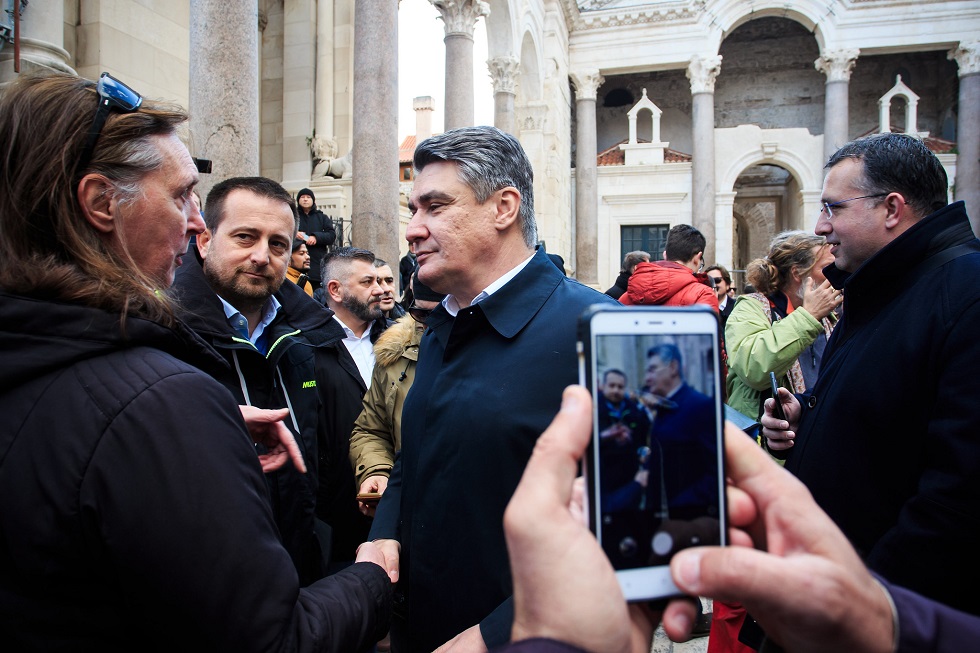
Milanović Notes His Successes and HDZ Failures
Asked why he thought he would be a better president than prime minister, Milanović replied that they were two "substantially different jobs." He claimed that, as prime minister, he pulled the country out of a severe crisis, and that HDZ has increased Croatia’s public debt twice as much as his government had. "Even with the Plenković government, the public debt has grown by almost 20 billion HRK," Milanović said, adding that "within a half year it had paradoxically decreased by three billion during the time of Orešković."
Milanović also asserted that his government was "therapeutic for Croatia, relatively fair, free of affairs, imprisonment and indictments." He said that Croatia had entered a period of "economic expansion" during his government.
"Then comes Kitarović, and we get someone who cannot not read, write or speak Croatian (Tihomir Orešković). Then Plenković shows up and things really haven’t changed much – if at all. We currently live in a time of minimal economic growth," Milanović emphasized. He added that “we rank last in European countries to completely utilize available EU funds.”
Croatia World Superpower in Tourism Only
According to Milanović, under HDZ’s rule, we have failed to integrate into the European and world markets except in tourism where we are a world superpower.
"We live off of peace, stability, warm seas and perhaps too much from selling these resources, and the current president does not understand this," Milanović concluded. "Geopolitics is very important because you need to know whom you associate with and choose respectable partners. However, HDZ and the president have chosen to associate with bad partners."
Croatia President Appeared Alone on N1 Sunday
Despite sending the same invitation to the headquarters of both candidates, N1 did not have official confirmation from either headquarters that the candidates would participate today’s debate on N1. However, the current president and candidate for second term, Kolinda Grabar-Kitarović, showed up.
Her opponent Zoran Milanović did not appear, and Nataša Božić, editor of “Tocka na tjedan” (Topic of the Week) had a conversation with the president, while a chair for her opponent sat empty.
President Clarifies Message to Voters
"I called on the citizens to vote for Croatia for everyone, not for a divided Croatia," the president said, explaining her message to voters to "choose the right Croatia."
"I do not want to divide our country into either us or them, but to vote for Croatia, and unite around common values," said Grabar Kitarovic, who initially told Nataša Božić that she did not tell the voters at the recent Karlovac rally that they were choosing "the right Croatia ".
"I am sending my messages and expect that the Croatian voters will vote based on what I represent and based on my program," she said.
Successes of First Presidential Term
“I have not fulfilled some of my promises, because during my term you could see that some objectives were impossible to achieve or there were other priorities, but this is what I have done,” Grabar-Kitarović said of her achievements in the first term.
"I have saved taxpayers 25 million HRK in five years, which may not seem like much to some people, but if you have a budget that is just over 30 million, then 25 million is a respectable figure," the president added.
President Tells Voters to Circle Wrong Ballot Number
"Dear Voters, I urge you to go to the polls on January 5, 2019 and cast your vote for Croatia and continue the process of growth and development. Vote for a Croatia that knows and can do better, a Croatia that is proud of its values, a Croatia that does have an inferiority complex on the world stage but is an equal participant. I urge you to circle number 1 on the ballot for Kolinda Grabar-Kitarović," the president told voters.
Zoran Milanović, her opponent, is number 1 on the ballot for the upcoming runoff presidential election. The current president is number 2 on the ballot. This is the latest in a series of campaign gaffes by Kolinda Grabar-Kitarović which have led to questions regarding her ability to continue managing the demands of the office.
Follow our Politics page for developments during the final days of the Croatia presidential campaigns. We will be providing by-the-minute exit poll updates and election results after the polls close at 19h on January 5, 2020.
Croatia Presidential Election: Grabar-Kitarović, Milanović go to Round Two
According to election results released at 5h CET (with 99.98% votes processed) on December 23, 2019; Croatia President Kolinda Grabar-Kitarović and former Prime Minister Zoran Milanović will advance to round two of the Croatian presidential elections on January 5, 2020. Miroslav Škoro, a popular folk musician, who was closely trailing Grabar-Kitarović in the early exit polls, will not advance to the second round.
Here is a breakdown of the final results for all eleven presidential candidates:
29.55% - Zoran Milanović – Former Prime Minister | SDP
26.65% - Kolinda Grabar-Kitarović – Current President | HDZ
24.45% - Miroslav Škoro – Folk singer and former Croatian Parliament Representative | Independent
5.87% - Mislav Kolakušić – Former Judge and EU Parliament Representative | Independent
4.61% - Dario Juričan – Legal name: Milan Bandić. Filmmaker and Performance Artist | Independent
2.89% - Dalija Orešković – Former Chair Conflicts of Interest Croatian Parliament | Independent
2.31% - Ivan Pernar – Member of Croatian Parliament | Party of Ivan Pernar
1.12% - Katarina Peović – Former member of Zagreb City Council | Workers’ Front
0.95% - Dejan Kovač – Economist and Princeton graduate | HSLS
0.21% - Anto Đapić – Former Osijek Mayor and Former Member of Croatian Parliament | DESNO
0.15% - Nedjeljko Babić – Regional party candidate | HSSČKŠ
First Woman President of Croatia
Kolinda Grabar-Kitarović, born April 29, 1968; is the fourth and current President of Croatia since 2015. She is the first woman to be elected to the office since the first multi-party elections in 1990. At 46, she also became the youngest person to assume the presidency.
Before her election as president, Grabar-Kitarović held several governmental and diplomatic positions. She was Minister of European Affairs from 2003 to 2005, the first female Minister of Foreign Affairs and European Integration from 2005 to 2008, Croatian ambassador to the United States from 2008 to 2011 and the NATO Assistant Secretary General for Public Diplomacy from 2011 to 2014.
Grabar-Kitarović was the only female candidate in the Croatian presidential elections held in December 2014 and January 2015 and was runner-up in the first round. She proceeded to narrowly defeat incumbent President Ivo Josipović in the second round. Her strong performance in the first round was unexpected, as most opinion polls had given President Josipović a strong lead. In the second round, Grabar-Kitarović defeated Josipović by 1.48%, which was the closest percentage margin of any presidential election to date.
She was a member of the conservative of HDZ (Croatian Democratic Union) from 1993 to 2015 and was also one of three Croatian members of the Trilateral Commission, but was required to resign both positions upon taking office as president in 2015, as Croatian presidents are not permitted to hold other political positions or party membership while in office. In 2017, Forbes magazine listed Grabar-Kitarović as the world's 39th most powerful woman.
Grabar-Kitarović’s 2019 presidential campaign has been marked by a series of gaffes and apparent missteps. She enjoys a warm political association with controversial Zagreb Mayor Milan Bandić, whose party officially endorsed her candidacy. Last week, she claimed during a campaign rally in Osijek that she had secured jobs for Croatian citizens to work from home for 8000 EUR, after they had received training abroad.
After refusing to debate other presidential candidates before the first election round; she relented and agreed to one debate with all eleven candidates on HRT (Croatian Radio Television), a public network frequently accused of favoring the president’s former political party (HDZ). Even though only three of the eleven presidential candidates were consistently polling in the double digits, Grabar-Kitarović refused offers by commercial networks to debate her top two contenders. She justified her decision by indicating that she believed all the presidential candidates should be heard. The resulting debate, which took place just days before the election, was a two-and-a-half-hour fiasco, in which all eleven candidates were given opportunities to discuss their views on abortion, religious education, corruption, border control and gay pride.
Former Prime Minister of Croatia
Zoran Milanović, born October 30, 1966; is the former Prime Minister of Croatia, a position which he held from December 2011 to January 2016. He was the leader of SDP (Social Democratic Party of Croatia), the largest centre-left political party in Croatia, from 2007 to 2016. He served as Leader of the opposition twice, from 2007 to 2011 and from January to November 2016, when Davor Bernardić succeeded him as SDP leader.
After graduating from the Zagreb Faculty of Law, Milanović began his career the Croatian Ministry of Foreign Affairs. He served as an advisor at the Croatian Mission to the European Union and NATO in Brussels from 1996–99. In 1998 he earned his master's degree in European Union law at the Flemish University in Brussels and was an assistant to the Foreign Minister of Croatia for political multilateral affairs in 2003.
In June 2007 he was elected President of SDP, following the death of Prime Minister Ivica Račan. In 2011, Milanović initiated the formation of the Kukuriku coalition, uniting four center-left political parties. The coalition won an absolute majority in the 2011 parliamentary election, and SDP became the strongest party in parliament. Milanović became Prime Minister on December 23, 2011, after the parliament approved his cabinet.
Milanović’s term as Prime Minister was marked by Croatia's entry into the European Union. His cabinet introduced changes to the tax code, passed a fiscalization law, and began several large infrastructure projects. Milanović also supported the expansion of same-sex couples rights and introduced the Life Partnership Act.
Following the 2015 election, he was succeeded as Prime Minister by Tihomir Orešković. Milanović led the four-party coalition until the early parliamentary elections in September 2016. Following a surprise defeat, Milanović announced his withdrawal from politics. He then entered the consulting business and worked as an advisor to Albanian Prime Minister Edi Rama.
On June 17, 2019; Milanović announced that he would be running for President of Croatia as the SDP's candidate in the upcoming election. Under the slogan “A President with Character,” he ran his campaign based on center-left principles and values, and his record as prime minister. He acknowledged making mistakes as Prime Minister and does not want to increase the powers of the Croatian presidency, which have been reduced since President Franjo Tuđman’s term ended in 1999. Milanović also insisted that he would not participate in a presidential debate without Kolinda Grabar-Kitarović’s guaranteed participation, which was verified a day before the presidential debate was broadcast on HRT.
Popular Musician Fails to Advance
Miroslav Škoro, born July 29, 1962; is a Croatian pop-folk musician and politician. His music is characterized by its traditional tamburitza sound, updated to appeal to a contemporary audience.
Born in Osijek, Škoro completed his degree in Civil Engineering at the University of Osijek. He subsequently spent some time in the United States of America where he attended the Community College of Allegheny County for two years.
He emerged on the Croatian music scene with his debut album “Ne dirajte mi ravnicu” (Don’t touch my prairie) and produced a song of the same name, which would go on to be one of the most famous Croatian songs. In 2002, Škoro collaborated with controversial right-wing singer Marko Perković on the song "Reci, brate moj" (Tell me, my brother). They continued their collaboration on the single "Sude mi" (They're putting me on trial), which was dedicated to former Croatian general Ante Gotovina.
In addition to a music career, Škoro has enjoyed a career in politics. From 1995 to 1997, he was the Croatian general consul to Hungary. Between 2001 and 2006, Škoro was the Chairman of the Board of Croatia Records. In 2007, he joined HDZ (Croatian Democratic Union) and won a seat in the parliament the same year. Škoro took office in January 2008 but resigned ten months later due to his disappointment over the way he felt that politicians were being treated by the Croatian media.
On June 23, 2019; Škoro announced his candidacy in the 2019 Croatian presidential election. In a video message on his Facebook page, Škoro indicated that changes to the constitution are needed and that the president should have more powers. He maintained 3rd place in pre-election polls, close behind Grabar-Kitarović and Milanović. His campaign was supported by several right-wing parties including HKS, Hrast and Most.
Škoro’s presidential campaign has been marked by controversy. He was living in the United States during the Homeland War while many of his peers remained in Croatia defending her borders. He indicated that he would pardon convicted Croatian war criminal, Tomislav Merčep. During the presidential debate, he promised to send troops to secure the border to prevent illegal migrants from entering Croatia. Škoro also violated terms of the “election silence” at least three times since it went into effect 24 hours before election day and ended at 19h after the polls closed. During the election silence, candidates are forbidden from campaigning.
Follow our Politics page for updates on the 2019/2020 Croatian presidential elections.
Croatian Presidential Debate: Candidates on Abortion, Religion, Gay Pride
Yesterday evening HRT (Croatian Radio Television) moderated a debate between all eleven presidential candidates. It lasted over two and a half hours.
Here is a summary of the top three candidates’ (Kolinda Grabar-Kitarović, Zoran Milanović, Miroslav Škoro) positions on abortion, religious education, “Za dom spremi” and gay pride – according to Index on December 18, 2019.
Croatian Candidates’ Opening Remarks
Kolinda Grabar-Kitarović: I have been your president for 5 years and have been among our people and listened to your problems. I have also repositioned Croatia from a region in Central Europe to a place on the Mediterranean, where it belongs. I’ve raised the issue of demography and I was the first Croatian diplomat.
Zoran Milanović: I have something to offer and want to make our country happier and freer. I have extensive experience and consider politics an honorable job. It is up to our citizens to decide.
Miroslav Škoro: Given that this game has begun, I would like to say that I am sorry that there wasn’t a debate on commercial television. I apologize for that. Kolinda is responsible for this and she must apologize.
Corruption in Croatian Society: How would you fight against it?
Kolinda: Constitutional obligations allow a president to be involved in secret service operations. I would build a collaborative relationship with secret services to address this problem. I've been fighting corruption for years, and it's time to recruit young talent for jobs in secret services.
Milanović: I’m aware of the limitations of a president in this area. The president may nominate the President of the Croatian Constitutional Court and can set an example by whom he chooses to associate with. He sends a signal to the public by paying attention to whom he hangs out with.
Škoro: When it comes to corruption, it is an obstacle to doing business in the Republic of Croatia. I am the only entrepreneur here who deals with business and encounters real problems.
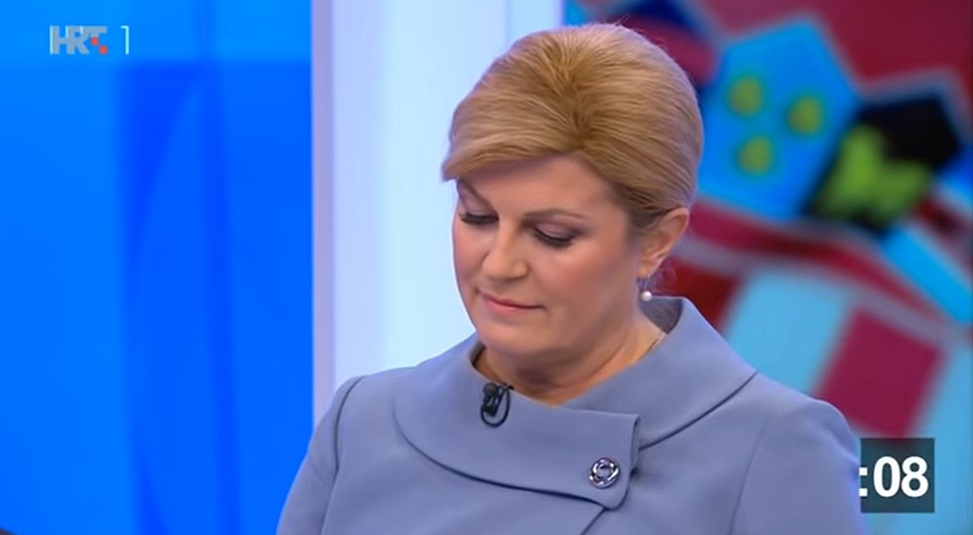
Should the Croatian army be sent to the borders?
Kolinda: The military should come to the aid of the police in border control. Presently, the police are saying they don't need help. The border situation in 2015 was chaos.
Milanović: It’s mindless statement to call the 2015 situation chaos. We did a fine job of transporting people. The police need help now.
Škoro: The border of every country is sacred. There are laws regarding the residence and movement of foreigners. The border absolutely must be protected. There are three types of migrants - refugees, people seeking political asylum and people who want to get from point A to point B. If necessary, the military should be sent to the border.
Should Croatia block Serbia's entry into the EU?
Milanović: Vučić is one topic. Serbia is another.
Škoro: The destruction of Vukovar, Škabrnja ... We all know who’s responsible. We need to address the issue of missing persons, borders and reparations for people who were held (by Serbs) in detention camps. Serbia needs to join the EU only after it meets the highest democratic standards. I will not raise my hand for Serbia's EU accession until that happens.
Kolinda: We need to talk about how to ensure a livelihood for our citizens. We will insist that Serbia meets all the conditions for accession, and they must come to terms with their past. I will absolutely insist that Serbia accounts for the people who are still missing (from the Homeland War in the 1990s) before they join the EU.
What kind of foreign policy should Croatia engage in with Bosnia?
Milanović: After 30 years of missteps, answering this question in one minute would be an insult to Bosnia. No one deserves to have their country summarized in one minute. I support a united Bosnia; half a million Croatians live there.
Škoro: Bosnia is a state of the Croatian people. Currently, Croatians in Bosnia are not autonomous. And Croatians did not elect the government led by Komšić.
Kolinda: Croatians in Bosnia are not the part of the diaspora. Rather, they are indigenous people there. We would support a good neighbor policy but are also fighting for the rights of the Croatian population there, without compromise. Bosnia has a strategic component for us. And to everyone who refers to Croatians in Bosnia as part of the voting machinery – that’s a grave insult.
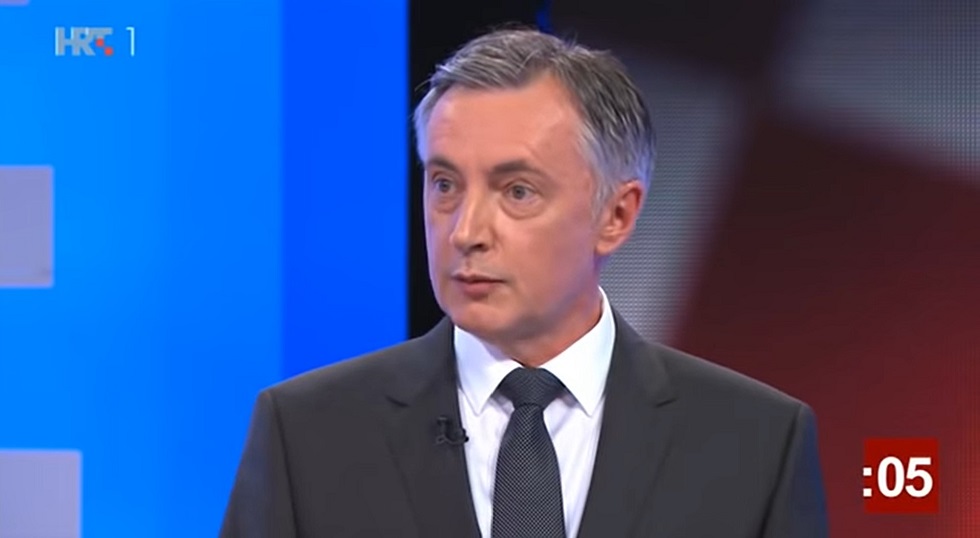
Should official signs in Vukovar include the Cyrillic alphabet – Yes or No?
Milanović: This is a matter of law; the rule of law. I would deal with this issue the same manner again. No one is offended by the co-existence of the Cyrillic and Latin alphabet in Vukovar cemeteries. I’ve acknowledged that perhaps I moved a little too quickly (as Prime Minister), and I could apologize for that. The HDZ (Croatian Democratic Union), the party of Kolinda and Škoro, is the one who created the legal framework in Vukovar. That's the truth and the whole truth. I enforced the law which HDZ put in place.
Škoro: I haven’t heard so much hate speech in one place for a very long time.
Kolinda: I've been going to Vukovar for years, for the (commemorative) days year after year. Their concerns are existential concerns, but war wounds still fester. Justice has still not been served. Why push for the Cyrillic alphabet before justice has been served? This issue needs to be addressed first, and then it will be right time to address the Cyrillic (signage).
Abortion?
Milanović: It's a matter of choice. It's a difficult situation, but it's first and foremost a woman's choice.
Škoro: I am against abortion and for protecting life from conception to death.
Kolinda: Life begins from conception to natural death. A ban on abortion would solve nothing and cause even more health problems. I am more for education, especially for young people, women and men, and for facilitating adoption and other measures which will reduce the number of abortions in the Republic of Croatia.
Religion in Croatian schools?
Škoro: The church is deeply rooted in the Croatian identity. I don't see why having religious education in schools should be a problem. I spent my entire childhood and youth in religious education and didn’t learn anything harmful there.
Kolinda: Religious education is an elective subject. I don't see what the problem is. Croatia offers religious instruction, which is a topic of culture in general. And children who do not go to church have an opportunity to learn something about other faiths.
Milanović: Religious education can be offered, but only as an elective course. But not in the third hour of school – that’s not an elective class. It must be at the end of the school day, during the last hour.
Would you participate in a gay pride or a pro-life march?
Škoro: We are discussing peripheral matters. Sexual orientation is a private matter for every person and should not be flaunted publicly, and I would gladly attend a pro-life march.
Kolinda: I do not know why these two demonstrations must be in opposition to one another. I only participate in the commemoration march (in Vukovar). I am responsible for all our citizens.
Milanović: Three days ago the Germans announced that homosexuality is normal. What else can I say?
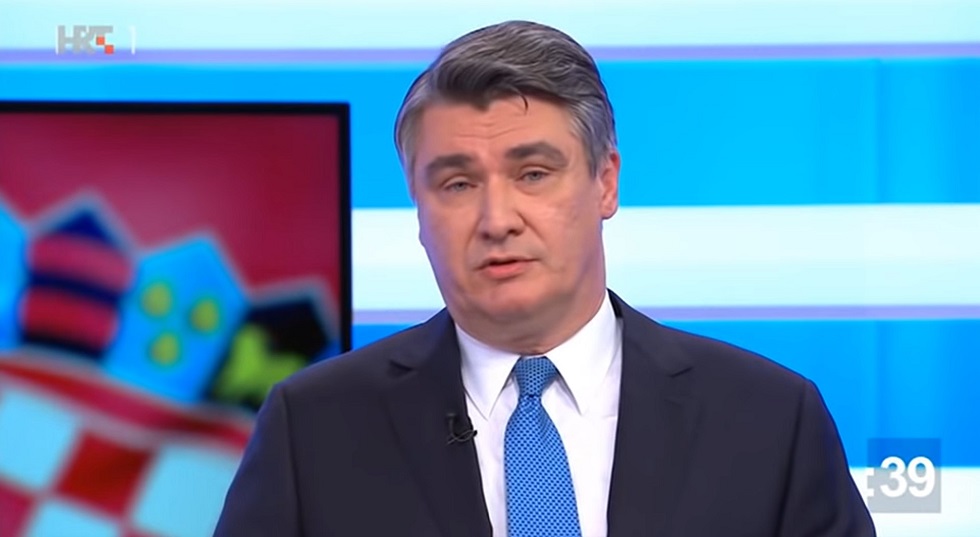
What does Franjo Tuđman mean to you? Tito?
Kolinda: For me, Tuđman is of the same caliber of Dr. Ante Starčević. I also established the Velered (highest honor in Croatia) for Dr. Tuđman. Tito played a positive role in anti-fascism, but he committed crimes after that.
Milanović: Broz, Radić, Tuđman and Krleža - these are people who defined the Republic of Croatia in the 20th century.
Škoro: Milanović is responsible for Lex Perković (Josip Perković is the former director of Yugoslav-era Croatian secret police).
Milanović: Perković was a HDZ guy who ate out of Tuđman’s hand.
What are your views on the slogan “Za dom spremi” (Ready for the homeland)?
Škoro: It's a salute that was used to say goodbye during the time of the NDH (Independent State of Croatia), but it was also on the sleeves of HOS members (among the first organized Croatian military defense forces in the Homeland War in the 1990s) and I don’t have a problem with that.
Kolinda: We need to stop discussing ideological issues. “Za dom spremni” was an Ustasha salute, but it was also on the insignia of the HOS forces and it had an entirely different meaning then.
Milanović: The Croatian Constitutional Court delivered two judgments which determined it to be hate speech.
Candidates’ Closing Remarks
Kolinda Grabar-Kitarović: I invite you to go to the polls on December 22nd. As your president, I have traversed every inch of this country and have developed my policies and program based on your problems, hopes and dreams. We must improve our situation. All I have heard tonight is a wish list, and rarely from anyone who really has a program. I am offering you action and diligence. Instead of inaction, I am committed to growth, sincerity and progress among our people and not arrogance. I am offering a message of unity: Croatia is for everyone.
Zoran Milanović: As your president, I will restore fundamental dignity and decency. As a politician I have worked hard and have made mistakes: abolished parliamentary pensions and opposed banks. Times change, I do not seek greater powers (within the Croatian presidency) because I consider those to be a path to tyranny. The president must maintain an objective distance and not be involved in money-related matters and staff decisions. I am here to serve and to seek your trust and vote.
Miroslav Škoro: This time (the presidential debate) was useful for viewers to see how futile this process is. I am a man who fights against the system. I am proposing radical changes and am seeking increased powers (within the Croatian presidency). On December 22, we will change the Constitution. I worry about one thing: my election observers have not yet received SEC (State Electoral Commission) accreditation and it all smells like election fraud.
Follow our Politics page for more information on the presidential candidates and the upcoming elections.
Croatian President Will Debate Presidential Candidates Tomorrow
The incumbent Croatian president has accepted the HRT invitation to debate with the other presidential candidates. We have learned that HDZ candidate, Kolinda Grabar-Kitarović, will nevertheless come face to face with the other presidential candidates in a debate, which is being coordinated by HRT (Croatian Radio Television) tomorrow night December 17, 2019 at 21:05h.
Grabar-Kitarović confirmed the news and stated that "each candidate who has collected 10 thousand signatures must have an equal opportunity and no one should be underestimated or favored before the first election round takes place."
All Eleven Croatian Candidates Expected to Attend
According to unofficial reports, all eleven presidential candidates are expected to show up at HRT studios on Tuesday at 21:05h. The debate will be televised on HRT1, as reported by Jutarnji List/Zadarski on December 16, 2019.
The eleven presidential candidates are:
Kolinda Grabar-Kitarović – Current President | HDZ
Zoran Milanović – Former Prime Minister | SDP
Miroslav Škoro – Folk singer and former Croatian Parliament Representative | Independent
Mislav Kolakušić – Former Judge and EU Parliament Representative | Independent
Dario Juričan – Legal name: Milan Bandić. Filmmaker and Performance Artist | Independent
Dejan Kovač – Economist and Princeton graduate | HSLS
Dalija Orešković – Former Chair Conflicts of Interest Croatian Parliament | Independent
Ivan Pernar – Member of Croatian Parliament | Party of Ivan Pernar
Anto Đapić – Former Osijek Mayor and Former Member of Croatian Parliament | DESNO
Nedjeljko Babić – Regional party candidate | HSSČKŠ
Katarina Peović – Former member of Zagreb assembly | Workers’ Front
Milanović Sought Guarantee for President’s Appearance
Earlier on Monday, SDP presidential candidate Zoran Milanović spoke about the debate, saying that he had sent an official memo to HRT seeking a guarantee that the current president would appear - otherwise he would not participate.
“Presidential candidate Zoran Milanović will participate in the debate organized by HRT on December 17, 2019 if President of the Republic, Kolinda Grabar-Kitarović, who is running as a candidate and defending her term, agrees to participate in the debate. If HRT, as organizer of the debate, can confirm and guarantee the arrival of President Grabar-Kitarović, Zoran Milanović is also ready to participate. Please confirm that she will attend,” the memo reads.
“However, we are still waiting for HTV's response. The day before the much-publicized debate, they don't want to reveal on public television whether Kolinda Grabar-Kitarović is coming to the debate? Give us an answer and let us know because we’ll continue to think that HTV is negotiating with the HDZ behind our backs. You're not going to bring Kolinda Grabar-Kitarović through the back door, in the dark, to Prisavlje (location of HRT headquarters), are you? We expect a response by 10am on Tuesday,” Milanović wrote on Facebook.
A response from Grabar-Kitarović's headquarters has arrived in the meantime.
"Finally, we were able to get a confirmation that the current president is coming to the debate. I'll respond. I know what I've been doing for the last 10 years and I know I'll be the target of criticism for those who want to celebrate through the night. My goal is for a normal Croatia and it starts on January 5th," read his Facebook update on December 16, 2019.
Earlier Debates Abandoned Due to President’s Non-participation
Zoran Milanović and Miroslav Škoro had refused to participate in debates among the four most popular candidates, which other TV stations had tried to coordinate, since Grabar-Kitarović chose not to participate. As she did not consent, planning for those debates failed. Mislav Kolakušić was the only candidate who had given his consent.
Be sure and watch the debate tomorrow December 17, 2019 on HRT1 at 21:05h. Follow our Politics page for updates on the 2019/2020 presidential elections.
Croatians Can Work Online for 8000 EUR: Kolinda Grabar-Kitarović
According to Croatian President, Kolinda Grabar-Kitarović, she has agreements with several countries which will enable Croatians to go elsewhere for training and then return home and work online. By working online, they will earn eight thousand euros in Croatia.
She also emphasized, during a campaign rally in Osijek, that the December 22nd presidential election is particularly important because we will be choosing a policy that will promote Croatian national and state interests, and the president will be working to resolve critical social problems over the next five years.
Croatians Must Think About Direction of Country
Grabar-Kitarović, Croatian president and HDZ (Croatian Democratic Union) candidate, who is running for another presidential term, stressed at the election rally that "we all need to think about where Croatia is heading. We must unite in our love for our homeland, and not focus on quarrels or excuses that nothing can be accomplished just because of a lack of leadership," she added, as reported by Index on December 15, 2019.
She assessed that Croatia is a country full of talented people and that we must work "together to enable our talented people to help Croatia attain her rightful place, which is among the most prosperous and best places to live in the world.”
“We have both resources and people, which is everything we need. All we need is good leadership, and not the kind of leadership which claims that nothing can be done, because that would just be a symbol for inaction. We need to get to work and take pride in our work," Grabar-Kitarović said.
Criticized Croatian Government Inaction
She recalled that, during her tenure, she has been critical of the Croatian government because she "does not want to be a salon politician" and announced that she would "continue to be critical of anyone who is not doing their job, not working for Croatia’s best interests, underestimates Croatia or believes that Croatia is small and insignificant."
"On the other hand, I will always lend a hand to anyone who wants to collaborate, because we can only achieve our goals by working together. Our nation is the source of power in this country. Don’t allow a few people tell you that they are more important than you are," she emphasized.
She continued by saying her parents taught her that goals can only be achieved through hard work, effort and dedication. And she "does not want idle people at the helm of the state because they just become the excuse that leadership is not doing enough."
New Deal: Croatians Can Work Online for 8,000 EUR
She said she would "create new jobs" even though some claimed that she couldn’t.
"I am telling you that we can accomplish this because I already have agreements with several countries, which will enable Croatians can go elsewhere for training and then return to Croatia and work online for another country. By doing this, they can earn eight thousand euros in Croatia. Imagine what that could mean for our young people," she noted. It isn’t clear whether the president was referring to an income of 8,000 EUR a year, which amounts to 4,960 HRK a month, or 8,000 EUR a month which is over 59,500 HRK a month or 96,000 EUR (714,363 HRK) a year. Nor did she disclose a timeline for the implementation of these agreements.
While the Croatian President did not clarify if the 8,000 EUR was monthly or annually, it is hard to decide which would be more ridiculous, given her enthusiastic announcement. Without any concrete details to back up the claim, 8,000 EUR a month is clearly absurd, while the annual figure would place it marginally above the minimum wage, hardly cause for chest-thumping celebration at a political rally.
"Do not underestimate your vote, every vote is important to me because it is a vote from my country, and I guarantee you that I will continue to be your voice and your president," Grabar-Kitarović added.
The head of her election headquarters, Osijek-Baranja County Mayor Ivan Anusić, emphasized that she is "the only candidate who is a Christian-Democrat and Croatian patriot, and the goal is for Kolinda Grabar-Kitarović to win the election."
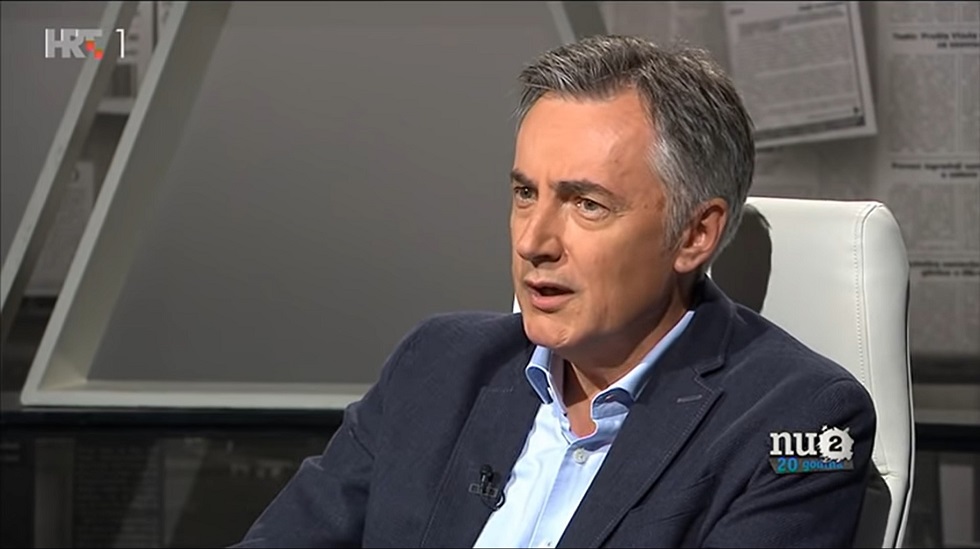
Other Candidate Should Have Been in Croatia in 1991
He asserted that the President’s campaign has been subject to attacks by Croatians in the media which are "not objective and realistic" and that the upcoming elections are important because the media have united "in attacking a woman who has more courage than all of them put together."
"Serving in the army in 1991 is not a requirement. And it's not a drawback if other candidates didn’t. But if you enter the race, my dear candidate, and your story is based entirely on the Homeland War, Croatian veterans, religion, love and homeland – then you should have been here in Croatia in 1991. Religion, faith and love mean absolutely nothing to the other candidate. Therefore, he didn’t need to be here, and he does not consider is a sin that he wasn’t.”
Osijek HDZ president Ivan Radić said the competition is full of "bitter, pessimistic and disappointed losers who don’t believe in Croatian knowhow and potential."
He said that SDP candidate Zoran Milanović registered for the election "without a vision, plan or program." Regarding presidential candidate Miroslav Škoro, he claimed that "this isn’t sport for him and that his politics only reflect frustration, hatred and the strange world hiding behind him."
We must send a clear message that our community is stronger than some believe, and we cannot be divided by people who consider this country to be an undesirable experiment, Radić concluded.
Here is a video of the president’s speech. Ivan Radić’s speech begins at 1:00:25, Ivan Anušić’s at 1:12:30, and the event concludes with the President’s speech, which begins at 1:27:50.
Check out our Politics page to follow the upcoming presidential election in Croatia. The first election round takes place this Sunday December 22, 2019.

